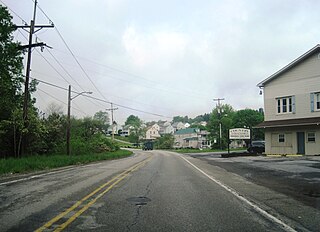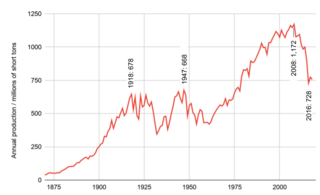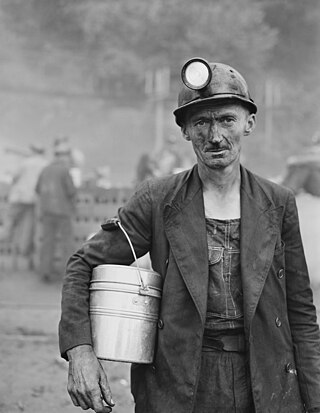
Paul Muni was an American stage and film actor from Chicago. He started his acting career in the Yiddish theater and during the 1930s, he was considered one of the most prestigious actors at the Warner Bros. studio and was given the rare privilege of choosing his own parts.

Jerome is a census-designated place (CDP) in Somerset County, Pennsylvania. The population was 779 as of 2010. It is part of the Johnstown, Pennsylvania, Metropolitan Statistical Area. Jerome is part of the municipality of Conemaugh Township, Somerset County, Pennsylvania, as are the nearby towns of Davidsville, Thomas Mills, Tire Hill, Seanor, Hiyasota and part of Holsopple.

Roslyn is a city in Kittitas County, Washington, United States. The population was 950 at the 2020 census. Roslyn is located in the Cascade Mountains, about 80 miles east of Seattle. The town was founded in 1886 as a coal mining company town. During the 20th century, the town gradually transitioned away from coal, and today its economy is primarily based on forestry and tourism. The town was the filming location for The Runner Stumbles, Northern Exposure, and The Man in the High Castle. Many of the town's historical structures have been preserved, and its downtown was added to the National Register of Historic Places in 1978.

John Llewellyn Lewis was an American leader of organized labor who served as president of the United Mine Workers of America (UMW) from 1920 to 1960. A major player in the history of coal mining, he was the driving force behind the founding of the Congress of Industrial Organizations (CIO), which established the United Steel Workers of America and helped organize millions of other industrial workers in the 1930s, during the Great Depression. After resigning as head of the CIO in 1941, thus keeping his promise of resignation if President Franklin Delano Roosevelt won the 1940 election against Wendell Willkie, Lewis took the United Mine Workers out of the CIO in 1942 and in 1944 took the union into the American Federation of Labor (AFL).

The United Mine Workers of America is a North American labor union best known for representing coal miners. Today, the Union also represents health care workers, truck drivers, manufacturing workers and public employees in the United States and Canada. Although its main focus has always been on workers and their rights, the UMW of today also advocates for better roads, schools, and universal health care. By 2014, coal mining had largely shifted to open pit mines in Wyoming, and there were only 60,000 active coal miners. The UMW was left with 35,000 members, of whom 20,000 were coal miners, chiefly in underground mines in Kentucky and West Virginia. However it was responsible for pensions and medical benefits for 40,000 retired miners, and for 50,000 spouses and dependents.

Michael Angelo Musmanno was an American jurist, politician, and naval officer. Coming from an immigrant family, he started to work as a coal loader at the age of 14. After serving in the United States Army in World War I, he obtained a law degree from Georgetown University. For nearly two decades from the early 1930s, he served as a judge in courts of Allegheny County, Pennsylvania. Entering the U.S. Navy during World War II, he served in the military justice system.

The Lattimer massacre was the killing of at least 19 unarmed striking immigrant anthracite miners by a Luzerne County sheriff's posse at the Lattimer mine near Hazleton, Pennsylvania, on September 10, 1897. The miners were mostly of Polish, Slovak, Lithuanian and German ethnicities. Scores more miners were wounded in the attack by the posse. The massacre was a turning point in the history of the United Mine Workers (UMW).

John Qualen was an American character actor of Norwegian heritage who specialized in Scandinavian roles.

The Molly Maguires is a 1970 American historical drama film directed by Martin Ritt, starring Sean Connery and Richard Harris. It is based on the 1964 book Lament for the Molly Maguires by Arthur H. Lewis.

Eckley Miners' Village in eastern Pennsylvania is an anthracite coal mining patch town located in Foster Township, Pennsylvania. Since 1970, Eckley has been owned and operated as a museum by the Pennsylvania Historical and Museum Commission.
The Coal and Iron Police (C&I) was a private police force in the US state of Pennsylvania that existed between 1865 and 1931. It was established by the Pennsylvania General Assembly but employed and paid for by the various coal companies. The Coal and Iron Police worked alongside the Pennsylvania National Guard, and later the Pennsylvania State Police, beginning in 1877. The remaining Coal and Iron Police commissions were allowed to expire in 1931, ostensibly ending the state-sanctioned organization of a private police force. Industrial policing continued in limited form until the later 1930s, when the National Labor Relations Act, the Fair Labor Standards Act, and other federal legislation made armed industrial forces illegal.

A breaker boy was a coal-mining worker in the United States and United Kingdom whose job was to separate impurities from coal by hand in a coal breaker.

Hector William "Harry" Cording was an English-American actor. He is perhaps best remembered for his roles in the films The Black Cat (1934) and The Adventures of Robin Hood (1938).
John Barcoski was a Polish émigré miner brutally beaten to death by Pennsylvania's Coal and Iron Police on February 10, 1929. His passing and subsequent acquittal of his murderers on the first-degree murder charges provoked public indignation, which eventually led to the end of Pennsylvania's private anti-labor Coal and Iron Police system.

Black Fury is an historical novel by the American writer and judge Michael Musmanno. The novel was developed from his script for the 1935 film of the same name, Black Fury.

The history of coal mining in the United States starts with the first commercial use in 1701, within the Manakin-Sabot area of Richmond, Virginia. Coal was the dominant power source in the late 1800s and early 1900s, and although in rapid decline it remains a significant source of energy in 2024.

The Illinois coal wars, also known as the Illinois mine wars and several other names, were a series of labor disputes between 1898 and 1900 in central and southern Illinois.

People have worked as coal miners for centuries, but they became increasingly important during the Industrial Revolution when coal was burnt on a large scale to fuel stationary and locomotive engines and heat buildings. Owing to coal's strategic role as a primary fuel, coal miners have figured strongly in labor and political movements since that time.
The Carbon County Strikes took place in Carbon County, Utah from 1903–1904. The strikes primarily consisted of Slavic and Italian immigrant mine workers who partnered with the United Mine Workers of America strikes in Colorado to protest the dangerous working conditions of the Utah coal mines. The Carbon County strikes were considered the most important labor confrontation in the United States at the time. The Utah Fuel Company strongly opposed initiatives to unionize coal workers in Utah and were the primary opposition to the UMWA at the time. The Carbon County Strikes would ultimately fail in its attempt to unionize the coal workers of Utah simply because it "did not have enough support, either internally or externally, to win against a powerful and influential company that effectively played on radical, anti-foreign sentiments in defending its position" but it demonstrated a significant nationwide effort in strengthening unionization in the west.
















